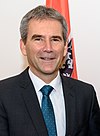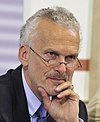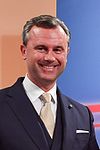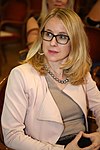Federal Government Brief I
| Federal Government Brief I | |
|---|---|
| 30. Federal Government of the Second Republic of Austria | |
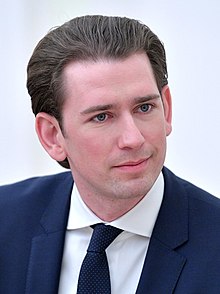
|
|
| Chancellor | Sebastian Kurz |
| choice | 2017 |
| Legislative period | XXVI. |
| Appointed by | Federal President Alexander Van der Bellen |
| education | 18th December 2017 |
| The End | May 28, 2019 |
| Duration | 1 year and 161 days |
| predecessor | Federal government core |
| successor | Provisional federal government Löger |
| composition | |
| Party (s) | ÖVP and FPÖ until May 22, 2019 ÖVP from May 22, 2019 |
| representation | |
| National Council | 112/183 until May 22, 2019 61/183 from May 22, 2019 |
The Federal Government Kurz I was the incumbent federal government of the Second Republic of Austria from December 18, 2017 to May 28, 2019 . The original coalition was after the order to form a government by the President of short Sebastian , the federal party leader from the national elections on October 15, 2017 emerged as the most votes fraction People's Party (OVP; turquoise) formed. The federal government appointed and sworn in by Alexander Van der Bellen and terminated in May 2019 consisted of members of the ÖVP under Chancellor Kurz and the Freedom Party of Austria (FPÖ; blue) under Vice Chancellor Heinz-Christian Strache . Sebastian Kurz was the youngest incumbent head of government in the world when he took office.
On October 23, 2017, the ÖVP decided to enter into coalition negotiations with the FPÖ for a turquoise-blue coalition ; this was communicated to the Federal President on the same day. The Social Democratic Party of Austria (SPÖ) under the then Chancellor Christian Kern announced on the same day that it would join the opposition. On October 24, Kurz announced the decision to form a coalition with the FPÖ to the public. The official coalition negotiations began on October 25th with a meeting in the Palais Niederösterreich . The conclusion of the negotiations was announced on December 15.
In the course of the Ibiza affair around Vice Chancellor Heinz-Christian Strache, he announced his resignation from the government on May 18, 2019. On the evening of the same day, Federal Chancellor Kurz declared the coalition to be over. Afterwards, Federal President Van der Bellen briefly informed about plans for the early dissolution of parliament. On May 20, 2019, Strache asked the Federal President in writing to be removed from his position, and the day after, Chancellor Kurz asked the Federal President to dismiss the incumbent Interior Minister, Herbert Kickl ; this was the first time in the Second Republic . After the remaining FPÖ government members had announced it in the days before, they asked for their removal from their offices on May 21. The Foreign Minister Karin Kneissl , who was nominated by the FPÖ but not a party, has decided to stay . Van der Bellen therefore commissioned Kurz to ensure a functioning federal government and to fill the vacant positions with experts.
On May 22, 2019, the Federal President dismissed Interior Minister Kickl on the proposal of the Federal Chancellor in accordance with Art. 70 Para. 1 B-VG and the removal of the other members of the government at their request in accordance with Art. 74 Para. 3 . At the same time as this formal act, Federal Minister Hartwig Löger (Finance, ÖVP) was appointed Vice Chancellor, the four experts proposed by Kurz were sworn in as Federal Minister and finally became Federal Minister Juliane Bogner-Strauss (ÖVP), in addition to her previous department, with the agendas and officials Sport (previously with Vice Chancellor Strache) entrusted. From that day on, Chancellor Kurz ruled with his cabinet as an ÖVP-led minority government. On May 27, 2019, the Kurz I government was finally refused confidence by the majority of the National Council at the request of the SPÖ with the approval of the FPÖ and NOW. The next day the Federal President removed the entire Kurz I government from office. At the same time, the previous Vice Chancellor Hartwig Löger was entrusted with the continuation of the administration and the chairmanship of the provisional federal government (excluding Kurz ) and the previous ministers of the Kurz cabinet were then entrusted with the continuation of official business in their departments.
Up to the still short of Chancellor on May 18, 2019 conjunction with the termination of the coalition government in the autumn scheduled election of the National Council was the June 3 interim government Löger by the transitional government created caretaker government Bierlein replaced.
Coalition negotiations
Steering group
The coordinators of the ÖVP and FPÖ directed for the coalition negotiations, a control group, who also belonged to himself. The first meeting took place on October 25, 2017.
- ÖVP:
- FPÖ:
Cluster groups
1. State and society : Spokesperson: Josef Moser (ÖVP) and Harald Stefan (FPÖ)
- Media:
- ÖVP: Gernot Blümel , Gerald Fleischmann , Hans Gasser (former Styria manager)
- FPÖ: Hans-Jörg Jenewein , Norbert Steger , Susanne Fürst
- Justice:
- Sports:
- Arts and Culture:
- Administrative reform and constitution:
- ÖVP: Josef Moser , Klaus Poier , Alfred Riedl
- FPÖ: Harald Stefan , Wolfgang Zanger , Matthias Eder (FPÖ Graz)
- Europe and Foreign Policy:
- integration
- ÖVP: Efgani Dönmez , Kurt Hohensinner , Susanne Knasmüller
- FPÖ: Gernot Darmann , David Lasar , Rudolf Moser (Graz City Council)
2. Security, order and homeland security : Spokesperson: Wolfgang Sobotka (ÖVP) and Walter Rosenkranz (FPÖ)
- Internal security
- ÖVP: Wolfgang Sobotka , Karl Mahrer , Werner Amon
- FPÖ: Walter Rosenkranz , Johann Tschürtz
- National defense
- ÖVP: Wolfgang Sobotka , Karl Nehammer , Michael Hammer
- FPÖ: Mario Kunasek , Reinhard Eugen Bösch
3. Fairness and new justice : Spokesperson: August Wöginger (ÖVP) and Dagmar Belakowitsch (FPÖ)
- bless you:
- Job:
- ÖVP: Karlheinz Kopf , Barbara Eibinger-Miedl , Helwig Aubauer
- FPÖ: Bernhard Rösch , Peter Wurm , Helmut Günther
- Pensions:
- ÖVP: Ingrid Korosec , Stefan Schnöll
- FPÖ: Werner Neubauer , Christian Ragger , Helmut Günther
- Women:
- Family and youth:
- Social and consumer protection:
- ÖVP: August Wöginger , Gaby Schwarz , Wolfgang Mazal
- FPÖ: Dagmar Belakowitsch , Christian Ragger , Peter Wurm
4. Location : Spokesperson: Bettina Glatz-Kremsner (ÖVP) and Hubert Fuchs (FPÖ)
- Finance and Taxes:
- ÖVP: Hans Jörg Schelling , Othmar Karas , Bernhard Gröhs
- FPÖ: Robert Lugar , Alexander Petschnig , Eduard Schock , Barbara Kolm
- Tourism:
- Economy and debureaucratisation:
- Transport and infrastructure:
- Energy:
- ÖVP: Stephan Pernkopf , Magnus Brunner , Josef Plank
- FPÖ: Wolfgang Klinger , Axel Kassegger , Dietmar Preinstorfer
5. Future : Spokesperson: Elisabeth Köstinger (ÖVP) and Axel Kassegger (FPÖ)
- Science and Research:
- Digitization and innovation:
- Education:
- Environment:
- ÖVP: Andrä Rupprechter , Michael Strugl , Monika Langthaler
- FPÖ: Walter Rauch , Gerhard Deimek
- Agriculture and rural areas:
- ÖVP: Andrea Schwarzmann , Georg Strasser , Alfred Riedl
- FPÖ: Manfred Muhr , Gottfried Waldhäusl , Walter Rauch
Government program
The 182-page government program “Together. For our Austria. ”Was presented to the public in December 2017. The principles of government work are freedom, responsibility, home, security, intergenerational justice, family, sustainability, performance, equal opportunities, clarity and subsidiarity. The government wants to promote entrepreneurship, reward the hardworking and ensure social equilibrium among all social classes. The aim is to reduce the tax burden on a sustainable basis and no longer incur any new debts in the medium term. The welfare state should be protected from abuse and illegal migration to Austria should be stopped.
Government members


Five of the ministers of the Federal Government Kurz I (Bogner-Strauss, Fassmann, Schramböck, Löger and Kneissl) were political lateral entrants . Sebastian Kurz was also the only member of the government who was previously represented in a federal government. The number of women ministers increased from three to five in comparison to the core government . Government spokesman was Peter Launsky-Tieffenthal .
On December 20, the new division of departments was resolved by an amendment to the Federal Ministries Act , which came into force on January 8, 2018.
| Office | photo | Surname | Political party | State Secretary | photo | Political party | ||
|---|---|---|---|---|---|---|---|---|
| Chancellor |
Sebastian Kurz |
ÖVP | ||||||
| Vice Chancellor |
Heinz-Christian Strache until May 22, 2019 |
FPÖ | ||||||
|
Hartwig Löger from May 22, 2019 |
ÖVP | |||||||
| Public service and sport |
Heinz-Christian Strache until May 22, 2019 |
FPÖ | ||||||
|
Juliane Bogner-Strauß was entrusted with the continuation of official business from May 22, 2019 |
ÖVP | |||||||
| Europe, integration and the outside world | Karin Kneissl | non-party (nominated by the FPÖ) | ||||||
| Interior |
Herbert Kickl until May 22, 2019 |
FPÖ | Karoline Edtstadler | ÖVP | ||||
|
Eckart Ratz from May 22, 2019 |
independent | |||||||
| Constitution, reforms, deregulation and justice | Josef Moser | non-party (nominated by the ÖVP) | ||||||
| Finances | Hartwig Löger | ÖVP | Hubert Fuchs until May 22, 2019 | FPÖ | ||||
| Work, social affairs, health and consumer protection |
Beate Hartinger-Klein until May 22, 2019 |
FPÖ | ||||||
|
Walter Pöltner from May 22, 2019 |
independent | |||||||
| Sustainability and tourism | Elisabeth Köstinger | ÖVP | ||||||
| National defense |
Mario Kunasek until May 22, 2019 |
FPÖ | ||||||
|
Johann Luif from May 22, 2019 |
independent | |||||||
| Transport, innovation and technology |
Norbert Hofer until May 22, 2019 |
FPÖ | ||||||
|
Valerie Hackl from May 22, 2019 |
independent | |||||||
| Education, science and research | Heinz Fassmann | non-party (nominated by the ÖVP) | ||||||
| Digitization and business location | Margarete Schramböck | ÖVP | ||||||
| Chancellery Minister for Women, Families and Youth | Juliane Bogner-Strauss | ÖVP | ||||||
| Chancellery Minister for EU, Art, Culture and Media | Gernot Blümel | ÖVP | ||||||
Assessment by political scientists
One year after the government was sworn in in December 2017, the political scientist Peter Filzmaier described the government as a “classic coalition” of barter deals. These were the basis for finding a government program, for example the FPÖ waived its resistance to the CETA trade agreement, while the ÖVP agreed to the repeal of the smoking ban in restaurants. On the other hand, the government would refuse to compromise in the parliamentary process with the opposition, arguing that there are no barter deals. Filzmaier called this a "communication gag".
Filzmaier and the political scientist Kathrin Stainer-Hämmerle found their public communication most noticeable after the first year. It was possible to convey the image to the outside world, not to argue. The communication work is "undisputedly professional". Issues that offer internal conflict material would be kept silent as far as possible. Stainer-Hämmerle criticized the fact that parliamentary procedures were sometimes "bypassed or undermined", for example in assessments. This style of "running over" would still occupy the Constitutional Court and the European Court of Justice. Many decisions, such as a speed of 140 km / h on the autobahn, are also primarily "symbolic", and many things have also got stuck in "announcement mode".
Demonstrations
On the occasion of the inauguration of the ÖVP / FPÖ coalition by the Federal President in the Leopoldine wing in the Hofburg, nine left-wing organizations called for demonstrations, the end of which was Heldenplatz . Due to the violent demonstrations during the swearing-in of government Bowl I in 2000 over the northern part of the hero's square, in the immediate vicinity Ballhausplatz , one of the police is with the Office of the President and the Federal Chancellery court ban imposed. According to the police, there were around 5,500 demonstrators who were largely peaceful.

On January 13, 2018, a large demonstration against the government took place in Vienna. The demonstration was organized by the Platform for a Human Asylum Policy, the Offensive Against the Right and the Radical Left Platform and, according to police, had more than 20,000 participants.
After the government presented a draft law in the course of making working hours more flexible, which makes the 12-hour day and the 60-hour week legally possible, the union called for a demonstration on June 30, 2018, the final rally of which was on Heldenplatz. According to the police, this demonstration had around 80,000 participants, including trade union representatives, SPÖ federal party leader Christian Kern and Vienna's mayor Michael Ludwig (SPÖ).
Another affair of the federal government Kurz I
See also
Web links
- Government program:
- sueddeutsche.de December 17, 2017: Vienna is planning a political turning point
- diepresse.com: In short, Minister: How they became what they are now
- derstandard.at: An overview of the government program of the ÖVP and FPÖ
- December 28, 2017: Politicians and intellectuals denounce Austria's government (and call for a boycott of Austria's EU presidency in the second half of 2018)
- January 10, 2018: Federal Chancellor Kurz: Massive tax relief for families decided
- May 18, 2019: Reforms and individual cases: balance sheet over a year and a half black and blue
- June 1, 2019 (sueddeutsche.de): 525 days full of scandals (a chronological review)
Individual evidence
- ↑ Hedda Nier: The youngest heads of state and government in the world. In: Statista.com. October 18, 2017. Retrieved December 19, 2017 .
- ↑ Vienna is committed to Europe. In: Der Spiegel , December 16, 2017.
- ↑ "Enough is enough": Sebastian Kurz opens the election campaign. In: diepresse.com . May 18, 2019, accessed February 9, 2020.
- ↑ Peter Temel, Michael Hammerl: "Enough is enough": Briefly announced the end of turquoise-blue and new elections. In: kurier.at . May 18, 2019, accessed February 9, 2020.
- ^ Federal President Alexander van der Bellen approves new elections. In: zeit.de . May 18, 2019, accessed February 9, 2020.
- ↑ Federal President dismisses all FPÖ ministers, including Interior Minister Kickl, Foreign Minister Karin Kneissl alone remains in office, Kurz wants to fill open positions with experts. In: derStandard.at. May 21, 2019, accessed May 21, 2019 .
- ^ Off for government short. In: ORF.at. May 27, 2019, accessed May 27, 2019 .
- ^ ÖVP and FPÖ are planning "a comprehensive budgetary inventory. In: Die Presse . October 25, 2017, accessed on October 28, 2017 .
- ↑ Addendum : Who Negotiates the Coalition . Article dated November 9, 2017, accessed November 10, 2017.
- ↑ www.news.at November 10, 2017: Coalition: Who is negotiating? .
- ↑ Graphic: Who is negotiating the coalition . Article of November 9, 2017.
- ↑ Together. For our Austria. Government program 2017–2022, accessed April 1, 2019
- ↑ orf.at: Launsky-Tieffenthal becomes government spokesman . Article dated December 16, 2017, accessed December 16, 2017.
- ↑ derStandard.at: How the responsibilities of the ministries were divided . Article dated December 19, 2017, accessed December 19, 2017.
- ↑ orf.at: Schramböck sworn in as minister . Article dated December 18, 2017, accessed March 31, 2018.
- ↑ profile: Ministers meanwhile ÖVP members . Article dated March 29, 2018, accessed March 31, 2018.
- ↑ a b orf.at: One year ÖVP-FPÖ: “Classic coalition” of barter transactions . Article dated December 18, 2018, accessed December 21, 2018
- ↑ kleinezeitung.at: 5,500 people demonstrated in Vienna against the new government , article from December 18, 2017, accessed on December 19, 2017
- ^ ORF-Online: Demo against government bigger than expected ; accessed on Jan 14. 2018
- ↑ ORF-Online: tens of thousands at demo against twelve-hour day ; accessed on June 30, 2018



